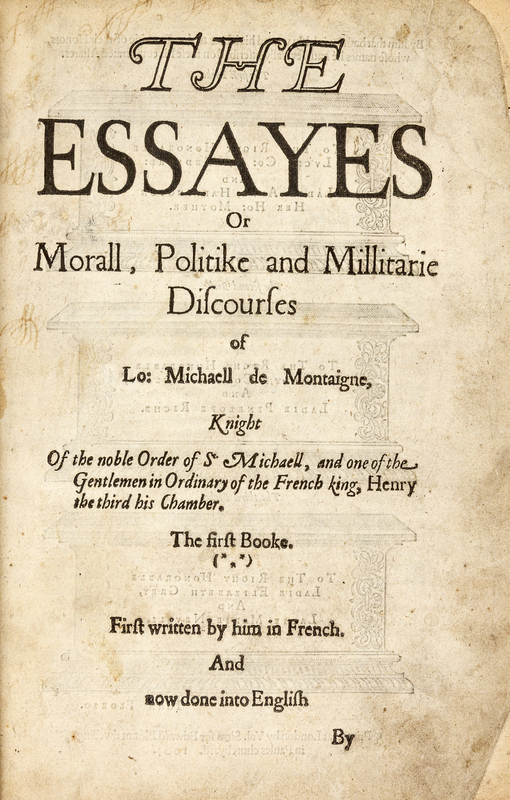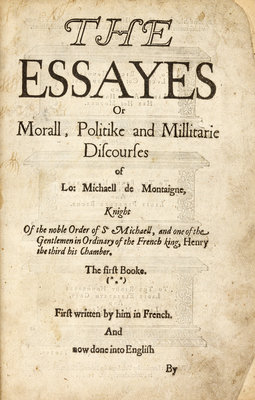Condition Report
Contact Information
Lot 60
MONTAIGNE, Michel Eyquem de (1533-1592). The Essayes or Morall, Politike and Millitarie Discourses. Translated from French into English by John Florio. London: Valentine Sims for Edward Blount, 1603. FIRST EDITION IN ENGLISH.
Sale 714 - Library of a Midwestern Collector
Nov 5, 2019
10:00AM CT
Live / Chicago
Own a similar item?
Estimate
$5,000 -
7,000
Price Realized
$10,625
Sold prices are inclusive of Buyer’s Premium
Lot Description
MONTAIGNE, Michel Eyquem de (1533-1592). The Essayes or Morall, Politike and Millitarie Discourses. Translated from French into English by John Florio. London: Valentine Sims for Edward Blount, 1603.
3 parts in one volume, small folio (273 x 183 mm). Three letterpress title-pages, numerous woodcut initials and headpieces. (First few leaves with old repairs to corners or margins not affecting text, I6 repaired affecting two lines at bottom, Ss6 and Tt1 with margin renewed just affecting shoulder note and page number, a few headlines or page numbers shaved, some minor browning or staining.) With π1 leaf of commendatory verses by Danyel. (Lacking 2Q4 blank at end of second part, one-word correction slip on B1, and 3 leaves of errata.) Early 20th-century mottled calf gilt, spine gilt, maroon morocco lettering-piece gilt, edges gilt, stamp-signed by Bayntun (neatly rebacked preserving original spine).
FIRST EDITION IN ENGLISH. In his introduction, Florio remarks on his philosophy as translator: "Why, then, belike I have done by Montaigne as Terence by Menander, made good French no good English. If I have done no worse, and it be no worse taken, it is well. As he, if no poet, yet I am no thief, since I say of whom I had it, rather to imitate his and his author's negligence than any backbiter's obscure diligence. His house I set before you, perhaps without his trappings, and his meat without sauce." His proclivity to reinvent material aside, Florio’s English translation was highly important in its time, influencing the work of Shakespeare, Bacon, Milton, Hobbes and Locke. “Montaigne devised the essay form in which to express his personal convictions and private meditations, a form in which he can hardly be said to have been anticipated…He finds a place in the present canon, however, chiefly for his consummate representation of the enlightened skepticism of the sixteenth century, to which Bacon, Descartes, and Newton were to provide the answers in the next” (PMM). ESTC S1111839; Pforzheimer 378; PMM 95.

